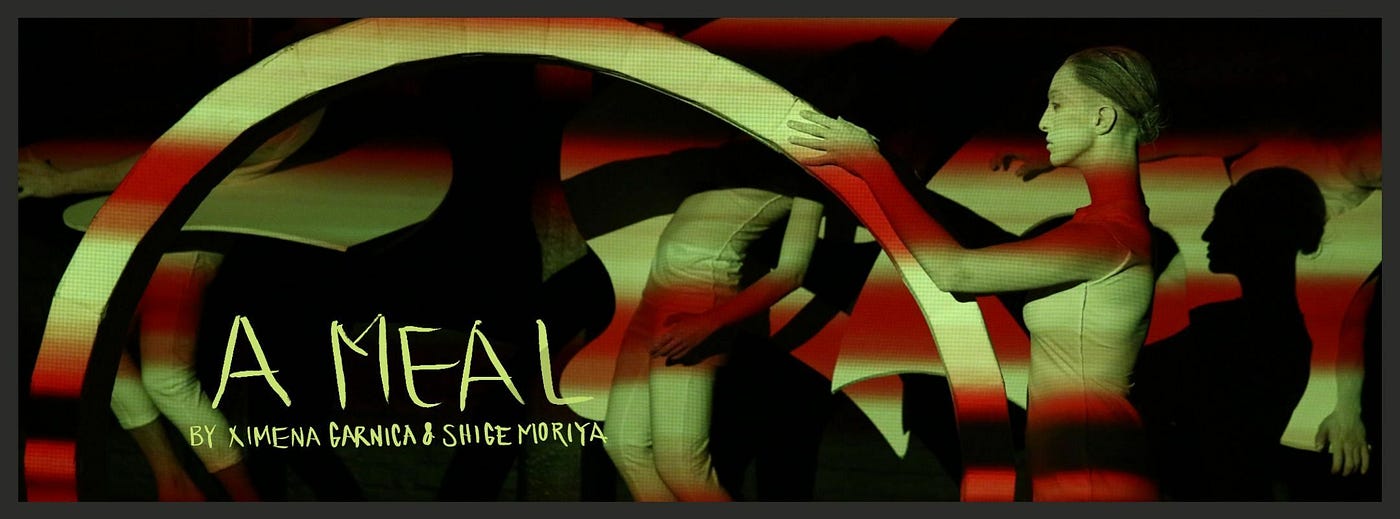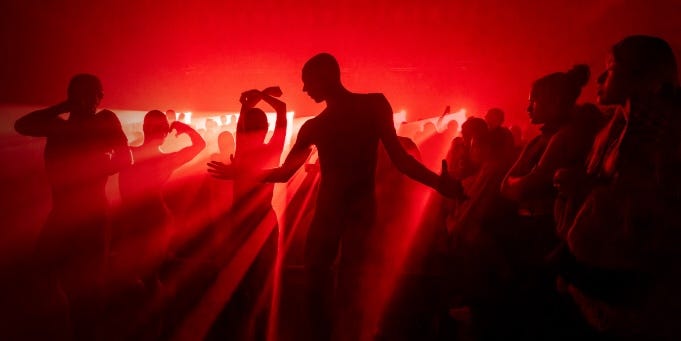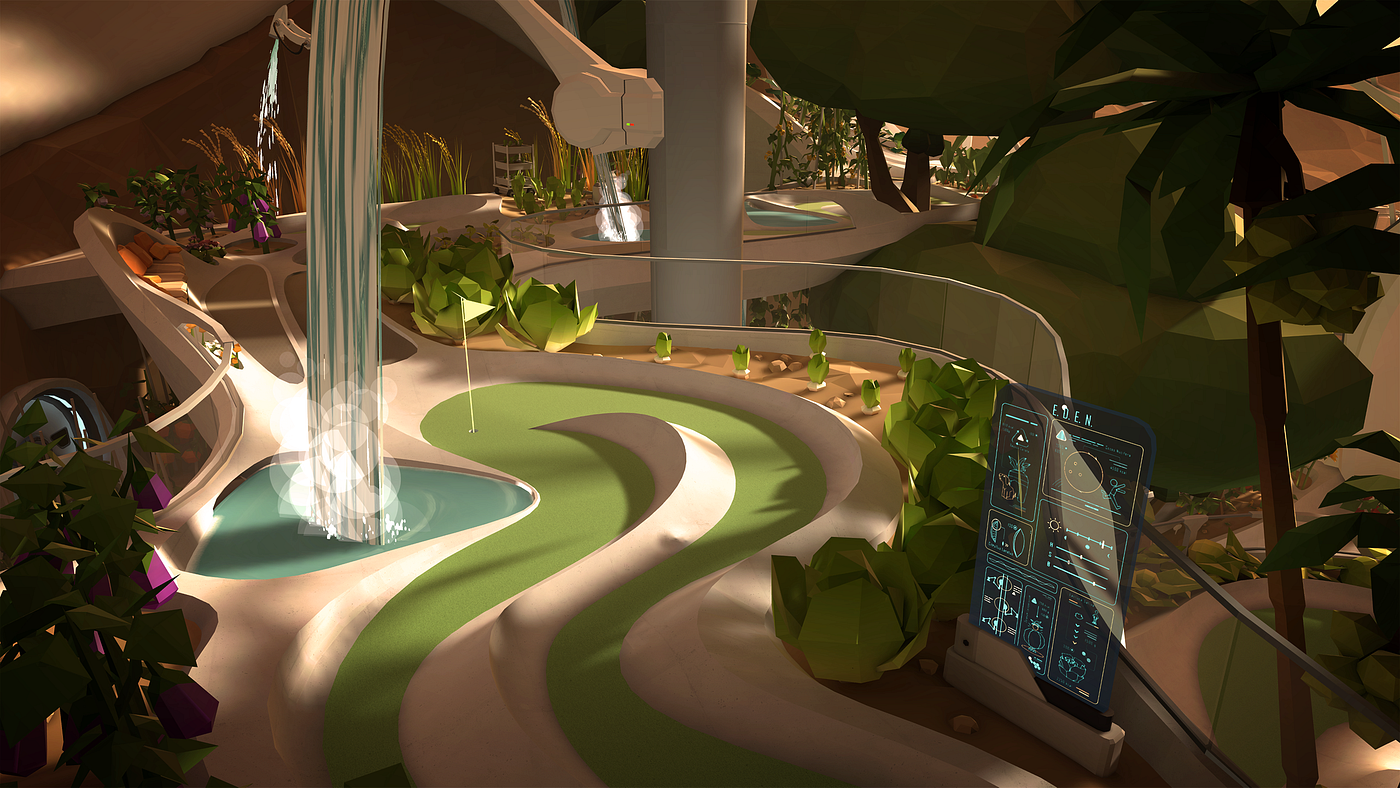Review Rundown: An Eclectic Otherworldly Immersive Set
Events in NYC & LA, with a side of mini golf on Mars


Look, sometimes no theme emerges. If you can find one in here congratulations, you’re probably less harried than I am this week.
That said: there’s fun to be had and concepts to be pondered. Some of the pieces this week “just work” while others hit some of the mark but not all.
Let’s get into it.
NoPro is 100% reader & listener supported. Join our Patreon campaign to secure & expand our coverage of Everything Immersive! Get the NoPro Newsletter and access to our Discord when you do.
Want more? Check out our most recent edition and our REVIEWS section.
Check out our How To Get Covered By NoPro guide to submit your events & experiences for review.
Want to get listed in our newsletter?
Submit a listing to Everything Immersive.

A Meal — LEIMAY/HERE
From $50; New York City; Through September 29
Meals are one of our most human experiences. They are ritual, communication, culture, creation, and art. They’re nourishment both emotional and physical, and they have ethical and supply chain implications. A Meal explores all of these in a 3+ hour… event.
It is exceedingly difficult to characterize what A Meal actually is. There are elements of theater, of dance, of film, of song. It is unmistakably ritualistic. It’s a conversation, and it’s also an actual meal.
A Meal is a bit like a group visit to an art museum and a dinner. The group moves at a set pace, which is deliberate and intentional and at times painfully glacial. I was happy to sit and experience some of the pieces for as long as they took. This was particularly pronounced during any of the pieces that involved singing — the performers have gorgeous voices that harmonize beautifully.
I had a harder time with the extended film and dance sequences. It was obvious there was intentionality behind them, and I would have liked more of an entry point into just what some of the pieces were conveying. I have theories and ideas, but I would have enjoyed some more messaging about what the intention was. Without that, I was done experiencing them after a few minutes… but they lasted much longer.
Everything about A Meal is intentional. One of the performers shared that the furniture and the tableware were hand-crafted for this piece. A sauce for the dinner was made months ago by one of the show’s co-creators from a family recipe. It’s hard not to smile at this level of love and care, and it comes across so strongly.
Where A Meal connected most with me was in the two main food segments. One was a lively street-style market scene with rolling carts of frankly delicious small plates. The other was the show’s finale, an extended creation of a dish with facilitated conversation about food, its ethics, and the memories we connect with food. It was absolutely lovely, and the care and devotion the whole piece carries infused into the food and conversation.
When I left the show, I was not at all sure what to think. But the more I thought, the more I liked it, and the more I’m glad I went. A Meal requires patience and digesting, but there are rewards to spending your afternoon dining with them.
— Penelope Ray, NYC Correspondent

Honor Bound — Randy Lubin and Jason Morningstar, Sinking Ship Creations
$95, NYC, Run Concluded
Honor Bound is a short-form LARP that explores toxic masculinity through a story of dueling. Over three hours, six players take the roles of the duelists, their seconds and the officiants, and you roleplay through the duel preparations with the constant option of backing out to avoid the conflict and accept disgrace. It’s a chance to inhabit some unsympathetic characters and see what motivates them.
The game takes place in Weehawken Dueling Grounds of New Jersey, the historic site of many elicit duels. Sinking Ship does a good job with the LARP facilitation — the location was symbolically resonant, the facilitator managed the game well, and there were excellent controls for safety and consent. Of course, you can buy the LARP script for $8 and run it yourself, so the price of this experience is a complex question. I don’t doubt that Sinking Ship brings value to consumers and pays its staff fairly. I support that, but I can’t help thinking this price is better suited to beginning LARPers who need the scaffolding of this facilitation over expert players who can do all of that themselves.
The LARP itself works well although I would quibble about the theme. A collective storytelling process ensures that the grounds of the offense are incommensurate with violence of the duel, guaranteeing that the duelists are risking death over something stupid. The characters in the game are either goading the duelists towards the violence or trying to dissuade them. But because there is no character that rejects the world’s central honor culture, there’s no voice that provides any escape hatch. My character would have jumped at a reasonable exit from fighting, but no one offered it; even people begging me to stop reinforced the idea that retreating would be seen as cowardice. The game thus became a poignant study in how peer pressure and cultural values lead people to make very stupid decisions.
Sinking Ship puts on and facilitates great games by masters of the craft. If you’re a LARP-curious beginner, you should definitely check them out. More experienced players may want to lean towards games such as Sacrament that you can’t run on your own. But if you’re up for a dark story, Honor Bound is a simple and effective LARP that’s easy to organize and you should try it if exploring toxic cultures interests you.
Get No Proscenium’s stories in your inbox
Join Medium for free to get updates from this writer.
SubscribeSubscribe
— Nicholas Fortugno, New York Correspondent

Life Line — Codex Arcanum
$25, Burbank, September 19th-21st
What makes life worth living? The answers are different for everyone, but the question itself holds a universality that establishes us in a community we often lose sight of. Living on this planet of eight billion people can feel desperately isolating at times, and when so much of our discourse is fueled by a caustic sense of hopelessness– politically, socially, environmentally, economically, how do you keep going? Life Line, the new play written and directed by Matt Harry, confronts this heavy subject matter with an earnest frankness as it charts a path to escape the potentially destructive gravity of existential nihilism towards something like hope — and the notion that many hands make the work light.
Seated in a circle of chairs in a small, carpeted multipurpose room of a local church, complete with doughnuts and nametags on the table and inspirational posters adorning the walls, the audience finds themselves cast as visitors of Life Line, a support group for those who have survived an attempted suicide. Joe, a young woman carrying the weight of a long string of bad days behind her and no relief in sight bursts into the meeting in a cry for help disguised as an extended diatribe on the futility of meetings like these and life itself. What follows is a verbal fencing match between her and Angela, the unflappable and determined group leader, who over the next hour patiently, methodically, talks Joe off of the proverbial ledge.
Both Dorothy Dillingham (Angela) and Taylor Karin (Joe) give nuanced, layered performances as two people in pain on opposing sides of an issue that has no easy answers. The site-specific nature of the production gives them absolutely nowhere to hide, all awkward in-the-round angles and static lighting–any falseness will register immediately. Seeing the cascading emotions pass across their faces from such a closeness as the performers navigate the complex journeys each of them make towards understanding was absolutely arresting, with tears flowing on both sides. The script is a vulnerable, unblinking cross section of how it feels to find yourself either reaching up out of or down into an emotional hole, and a few too clever by half rejoinders aside, the humor is welcome and balanced, keeping the audience from succumbing to the darkness.
As an immersive advisory, I feel the need to flag an item from the synopsis: “As part of the support group, you can participate as much or as little as you like.” Based on my experience, I don’t believe that is actually the case, but I also don’t feel that is necessarily a bad thing. Life Line is much more an intimate site-specific play in the round than it is a fully interactive experience. Apart from a welcome ice breaker at the top and a couple of very specific moments where single answer responses are solicited, the actors are on a carefully written conversational path that cannot be deviated from.
At times I found myself wanting to chime in, challenge an idea, offer a doughnut, but I quickly got the impression that doing so would have derailed things in a way that the actors would not have been able to smoothly recover from. This is ultimately a two person conversation, a heart to heart debate, and your job is to sit there, marvel at the vulnerability, and perhaps reflect quietly on your own feelings about the issues presented. I can ultimately see the wisdom in structuring it this way, though, as empowering the audience to improvise with free rein, essentially inviting them to LARP as a survivor of self harm, could lead to any number of uncomfortable outcomes.
Life Line tackles a stigmatized issue with unflinching earnestness, compassion, and absolute acknowledgement that there are no simple solutions, no saccharine quick fixes to this problem while still gently but firmly asserting that if you open yourself up to the world and do the work, day by day, things can get better. That if you or someone you know is struggling–there are people waiting to help. You aren’t alone. Shows like this–that’s my answer to the question.
— Chris Wollman, LA Correspondent

R.O.S.E. — Sharon Eyal and Gai Behar
$55, NYC; Run Concluded
What makes a dance club isn’t the quality of the dancers on the floor. Rather, it’s the features of the club that permit dancing — the music, the lights, the space, the crowd — that determine whether the club is good. This reality becomes clear in R.O.S.E., an interactive dance performance by Sharon Eyal and Gai Behar. It’s Park Avenue Armory’s latest foray into immersive and while much of R.O.S.E. is great, the Armory simply doesn’t have the elements to make a good club.
R.O.S.E. works as a dance performance. Live DJs spin good interesting music and there’s striking lighting effects. The show’s choreographed components consist of 8–20 dancers moving through the dancefloor. They are costumed in either somewhat obvious black fetish harnesses or in captivating pink-flesh-like bodysuits. Their movements pulse and throb as they drift like schools of fish through the crowd. Combined with strong color washes, they create incredible moments of motion with an organic quality that is often stunning.
But R.O.S.E. doesn’t work as an immersive work. When you enter the club-like space, performers mixed into the crowd try to get the dancefloor moving, building the crowd for 30 minutes. Performers then periodically manifest in the middle of the crowd and move through it, pushing people out of the way as they traverse the space. This occasionally makes a cool effect as waves of people part for the choreography, but it also makes the performance difficult to see. When it ends, the lights go out again and it’s 15 more minutes of the crowd dancing in the dark.
The issue is the Armory doesn’t draw a dance crowd — it’s an arts center. The energy is completely wrong. About half of the audience (including me) didn’t dance and watched from the stands. When there are no performers, there’s nothing to see except a decent approximation of a dancehall with a lame crowd. That’s more than half the show and it’s just boring, so much so that I got fed up and left early.
I can’t fault R.O.S.E. for its dance performances. Those worked. But you can’t just turn a random assortment of museum-goers into a club. A club is a community, and at least at the Armory, that community never formed, leaving us with a few great dance moments in a sea of boring wall-flowering.
— Nicholas Fortugno, New York Correspondent

Walkabout Mini Golf: Mars Gardens — Mighty Coconut
$3.99 DLC; Quest, Steam, PS2VR; Available Now
“I love this,” he said to no one in particular, utterly alone in the garden dome of a Mars colony. He surveyed the scene: scattered classroom materials clustered at the edge of vines heavy with oversized grapes only possible in the Martian gravity, smooth robotic arms of colossal scale whirling overhead, examining the crops as they thrive in the cool Martian sun.
Then he played some putt putt.
Mars Gardens is the latest course from Mighty Coconut for their ongoing Walkabout Mini Golf game, which is just about the most fun thing you can do in virtual reality on the regular. It is possibly the most beautiful of the courses so far — which is saying something — and while I was having a real Mark Watney of a time playing a solitaire game I was struck by how this is maybe the most social space Mighty Coconut has ever built in Walkabout.
Like: I want to throw a party here. I want to invite friends, the whole of the NoPro community and just kick it in this multi-level garden. Sure, we can play some putt putt — the courses have some subtle deviousness to them that are approachable without being overly puzzley.
The space is the star, and there’s even little bits of environmental storytelling that, at least on a quick run-through, point to the colony’s kids getting up to some shenanigans where they aren’t supposed to.
Existing fans of Walkabout should know this is a no-brainer of a buy. Those who haven’t jumped in yet, perhaps turned off by the blocky aesthetic, should know that this set pushes towards smooth curves and textures without completely abandoning Walkabout’s signature look. Indeed, I’d say it’s a top purchase on the DLC list, with only Labyrinth and Wallace & Gromit up higher purely for those who are fans of either. If you don’t have that flavor of nostalgia, Mars Gardens should be your first Walkabout DLC. Until the next banger comes out.
— Noah Nelson, Publisher
Discover the latest immersive events, festivals, workshops, and more at our new site EVERYTHING IMMERSIVE, home of NoPro’s show listings.
NoPro is a labor of love made possible by our generous Patreon backers. Join them today and get access to our Newsletter and Discord!
In addition to the No Proscenium website and our podcast, and you can find NoPro on Facebook, LinkedIn, YouTube, Instagram, and in the Facebook community also named Everything Immersive.